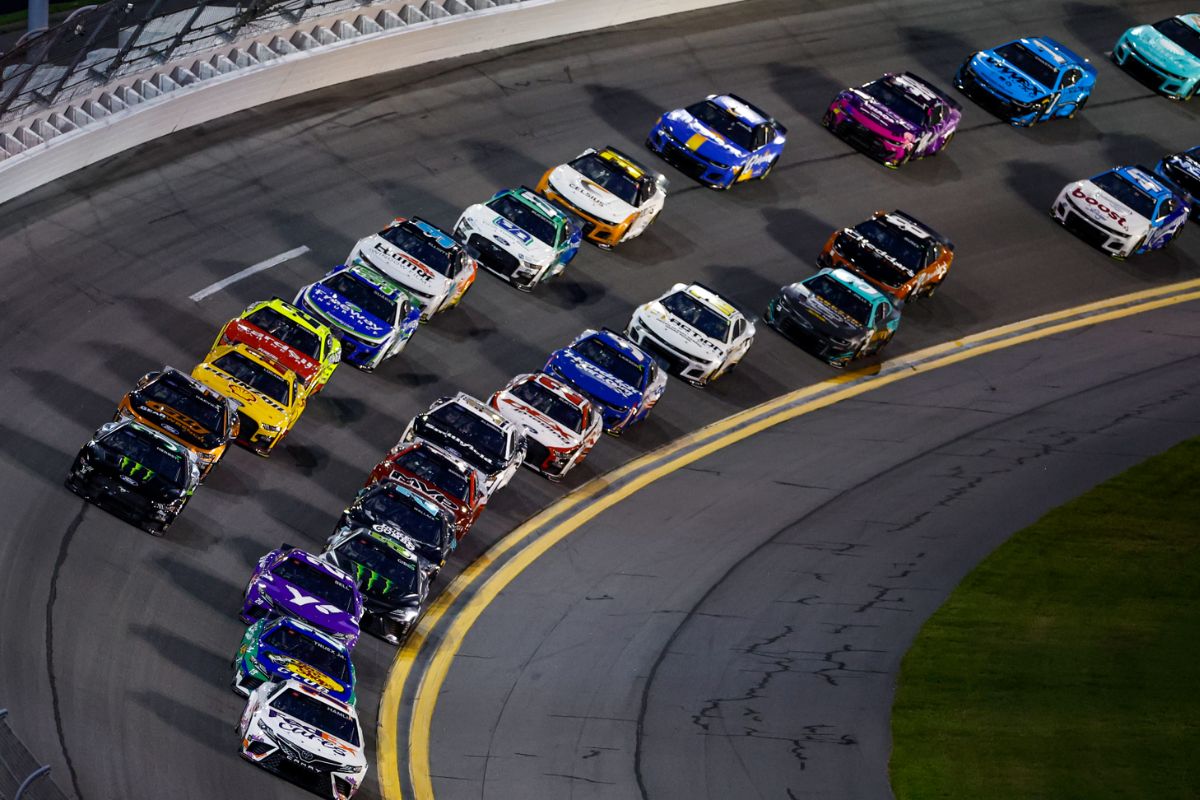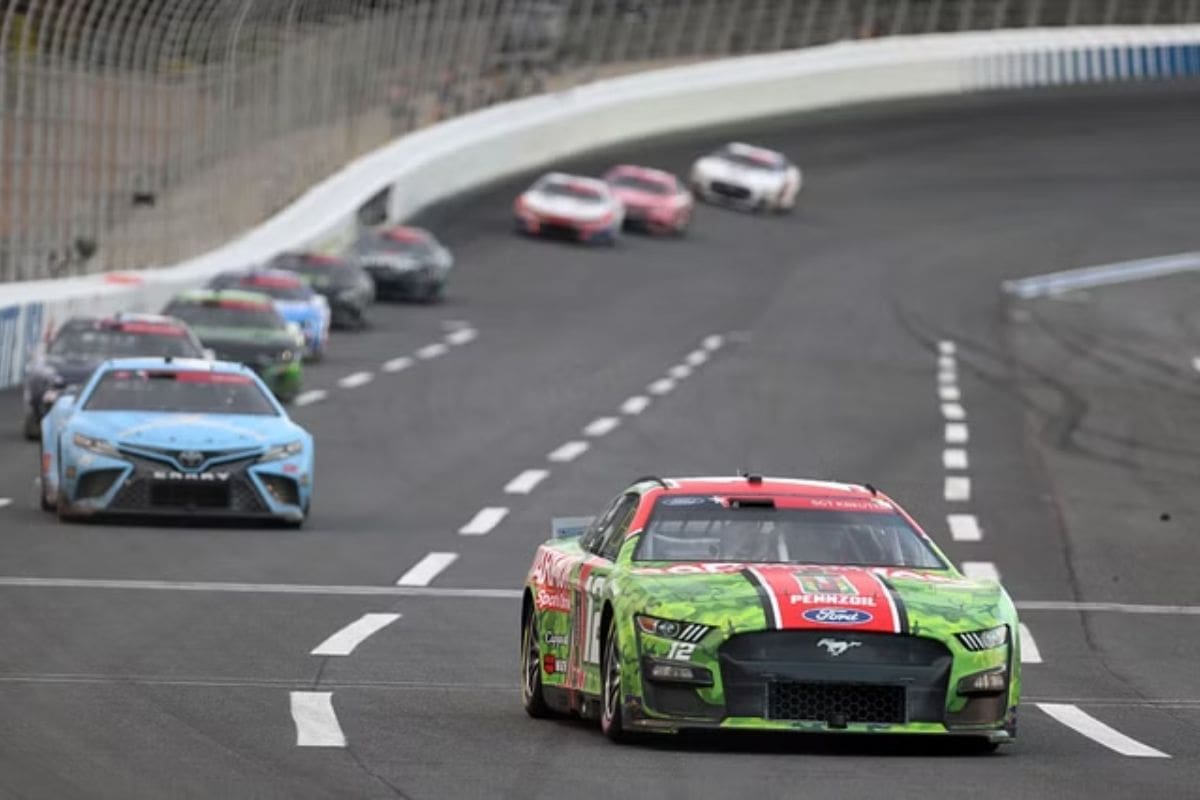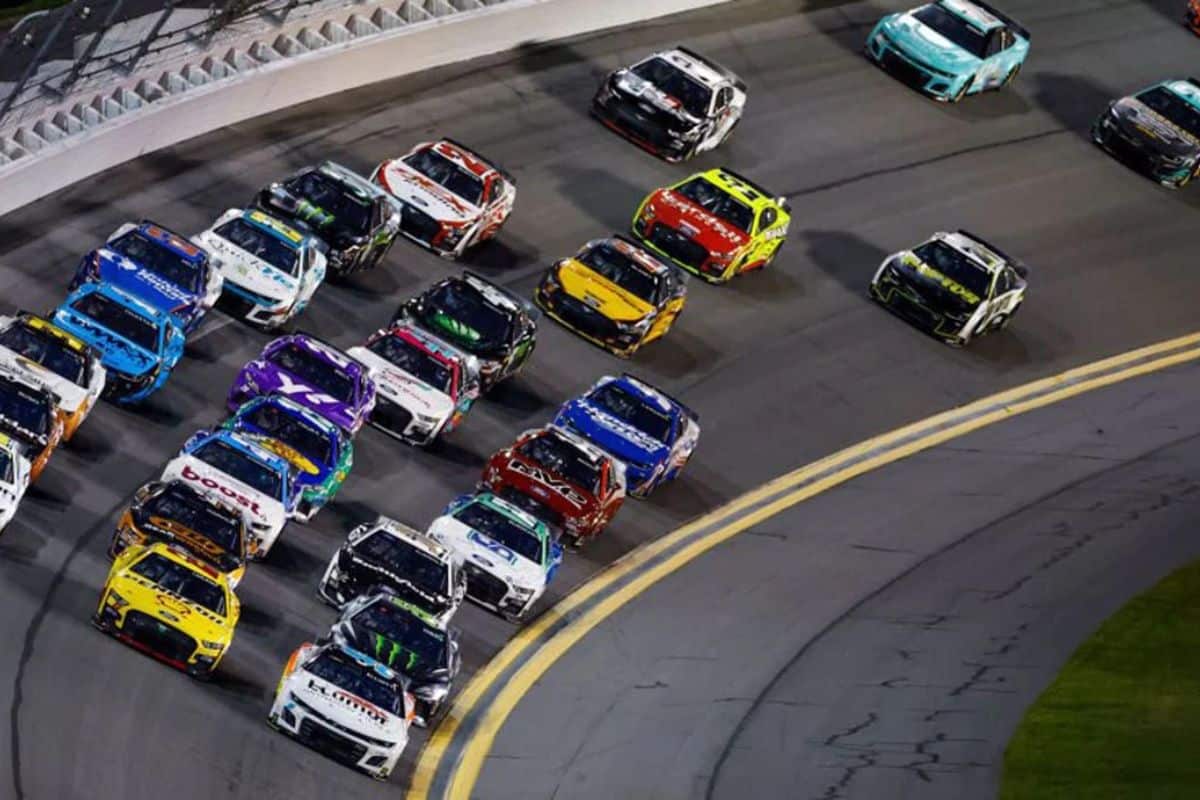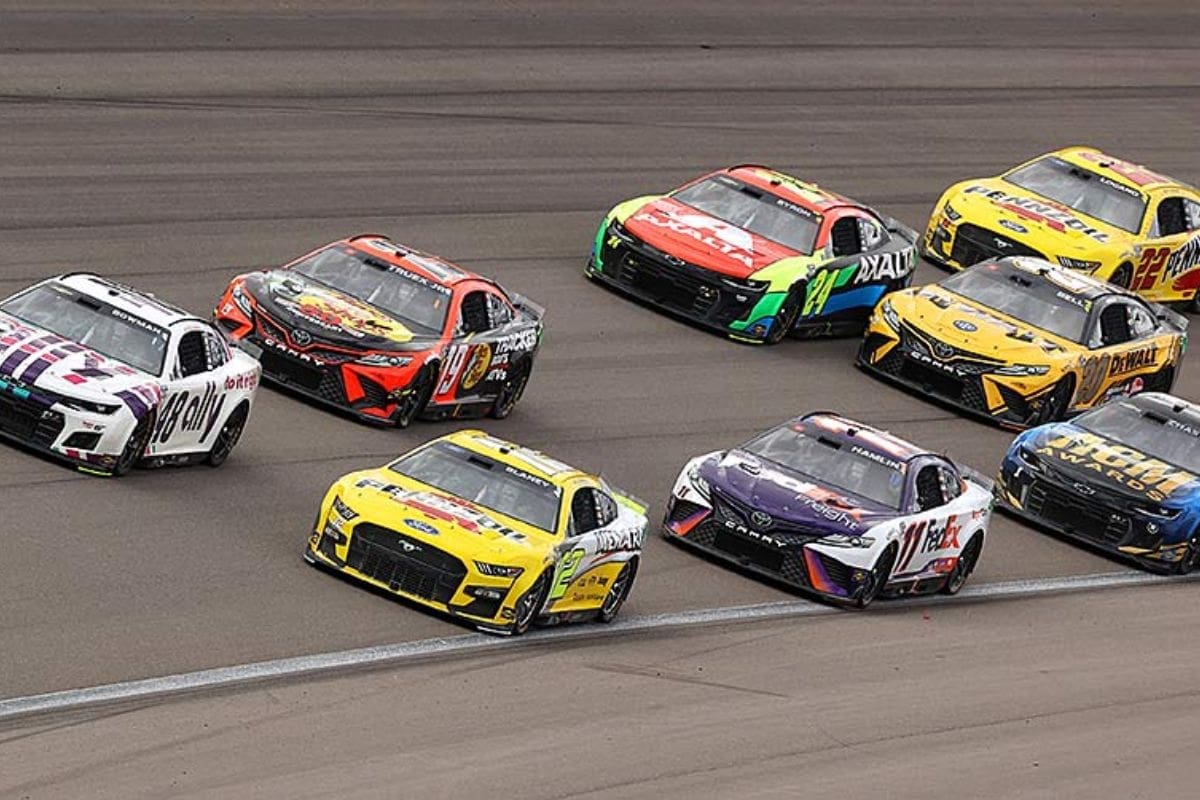FRM Emerges as a Life Saver: The NASCAR world was rocked by two significant announcements recently: the closure of Stewart-Haas Racing (SHR) at the end of the season and the potential transition of its employees to Front Row Motorsports (FRM). With SHR being a powerhouse in the sport, boasting two championships and 69 Cup Series victories since its inception in 2009, the decision to shut down operations marks the end of an era in NASCAR racing. Meanwhile, FRM’s emergence as a potential destination for SHR employees underscores the fluidity and complexity of team dynamics within the sport. Bob Pockrass’s tweets about FRM owner Bob Jenkins’s visit to SHR to discuss job opportunities have sparked speculation and discussion within the NASCAR community, highlighting the implications of these developments for teams, employees, and the broader NASCAR ecosystem.
Stewart-Haas Racing to Close at End of Season
Stewart-Haas Racing (SHR), a powerhouse in NASCAR with two championships and 69 Cup Series victories since its inception in 2009, will shut down operations at the end of this season. The announcement, made by co-owners Tony Stewart and Gene Haas on Tuesday, confirmed nearly a year of speculation regarding the future of the team. The news, delivered to SHR’s approximately 300 employees, marks the end of an era in NASCAR racing.
The decision to close the team was not made lightly. “It is a decision that did not come easily, nor was it made quickly,” Stewart and Haas stated. The announcement highlighted the labor-intensive nature of the sport and the extensive commitment required to compete at the highest level. For over a decade, SHR has been a formidable force on the track, and its closure underscores the challenges inherent in maintaining such a high level of performance.
Stewart-Haas Racing has been synonymous with success, boasting numerous victories and two championships. The team’s ability to consistently perform at the top of the sport has been a testament to the dedication of its owners, drivers, and staff. However, the demands of sustaining such success have taken their toll. Stewart and Haas emphasized that the decision was influenced by the need for a balance between their personal lives and business commitments, suggesting that the relentless pursuit of excellence had become unsustainable.
The announcement comes amid broader changes and challenges within NASCAR. Teams across the series have faced increasing financial pressures and the need for significant resources to remain competitive. SHR’s closure reflects these broader industry dynamics, as even successful teams struggle with the demands of modern motorsport. The departure of SHR from the NASCAR landscape will leave a notable void and prompt reflections on the sustainability and future direction of the sport.
As SHR prepares to wind down, the focus will be on honoring the legacy of the team and its contributions to NASCAR. The team’s employees, drivers, and supporters will undoubtedly feel the impact of this decision. Stewart and Haas expressed gratitude for the dedication and hard work of everyone involved with SHR, underscoring the collective effort that fueled the team’s success. The final races of the season will serve as a farewell tour, celebrating SHR’s achievements and the indelible mark it has left on NASCAR history.
FRM Eyes For SHR
Bob Pockrass’s tweet has sparked significant speculation and discussion within the NASCAR community regarding the future of both Front Row Motorsports (FRM) and Stewart-Haas Racing (SHR). According to Pockrass’s sources, FRM owner Bob Jenkins was reportedly at SHR earlier this week, discussing potential job opportunities with employees. This move suggests a significant development in the NASCAR landscape, as it implies a potential transfer of resources and personnel between the two teams.
The revelation that Jenkins visited SHR to explore job opportunities for his employees has raised questions about the motivations behind such a move. While FRM has not officially confirmed the source of its charter acquisition, the implication that it could be coming from SHR is evident. This speculation has fueled further interest in understanding the dynamics at play between the two teams and the potential implications for the upcoming NASCAR season.
The prospect of FRM acquiring a charter from SHR has significant implications for both teams and the broader NASCAR ecosystem. Charters are crucial assets in NASCAR, as they guarantee entry into every race and provide valuable financial benefits. If FRM secures a charter from SHR, it would represent a strategic maneuver to strengthen its position within the sport and enhance its competitiveness on the track.
The timing of Jenkins’s visit to SHR, coupled with the ongoing rumors surrounding SHR’s future, adds a layer of intrigue to the situation. With SHR announcing its closure at the end of the season, the team’s assets, including charters, become prime targets for acquisition. FRM’s potential acquisition of a charter from SHR underscores the fluidity of the NASCAR landscape and the constant evolution of team dynamics.
As fans and analysts await official confirmation from both FRM and SHR regarding the charter transfer, speculation will continue to mount about the implications for the upcoming NASCAR season. The potential realignment of resources and talent between the two teams could have far-reaching consequences for the competitive balance within the sport. Ultimately, Jenkins’s visit to SHR serves as a reminder of the intricacies and complexities of team operations in NASCAR, where strategic alliances and acquisitions play a pivotal role in shaping the future of the sport.
Transitioning to Front Row Motorsports
The recent developments surrounding Front Row Motorsports (FRM) and Stewart-Haas Racing (SHR) have presented a unique opportunity for employees of the latter. With the announcement of SHR’s closure at the end of the season, uncertainty loomed over the future of its workforce. However, Bob Jenkins’s visit to SHR earlier this week to discuss job opportunities for FRM has provided a glimmer of hope for SHR employees facing an uncertain future. This transition presents a chance for SHR workers to seamlessly transition to FRM, potentially retaining their positions within the NASCAR ecosystem.
For Stewart-Haas Racing employees, the prospect of joining Front Row Motorsports offers a lifeline amidst the uncertainty of the team’s closure. FRM’s willingness to absorb talent from SHR demonstrates a commitment to investing in experienced personnel and bolstering its capabilities on and off the track. This opportunity not only provides job security for SHR workers but also allows them to continue contributing to the sport they are passionate about.
Front Row Motorsports’ potential acquisition of a charter from Stewart-Haas Racing not only benefits SHR employees but also shows FRM’s emergence as a vital player in the NASCAR ecosystem. Founded by Bob Jenkins in 2005, FRM has steadily grown into a respected team with a competitive presence in the Cup Series. The team’s willingness to seize opportunities and adapt to the evolving landscape of NASCAR has positioned it as a lifeline for those seeking stability and growth within the sport.
FRM’s acquisition of a charter from SHR represents a significant milestone in its journey and a testament to its determination to compete at the highest level. By expanding its operations and acquiring additional resources, FRM is strengthening its position within NASCAR and solidifying its role as a destination for talent and ambition. The team’s commitment to providing opportunities for employees transitioning from SHR reflects its ethos of collaboration and mutual support within the NASCAR community.
The opportunity for Stewart-Haas Racing employees to transition to Front Row Motorsports represents a win-win scenario for both parties. For SHR workers facing uncertainty, FRM offers stability, growth, and the chance to continue pursuing their passion for NASCAR. Similarly, FRM’s acquisition of a charter from SHR underscores its emergence as a key player in the NASCAR ecosystem and its commitment to investing in talent and resources for future success. As the transition unfolds, both teams stand to benefit from this strategic move, highlighting the resilience and adaptability of the NASCAR community in navigating challenges and seizing opportunities for growth.

Twitter Users Pour Their Opinions
Bob Pockrass’s tweets about the potential transition of Stewart-Haas Racing (SHR) employees to Front Row Motorsports (FRM) have ignited a flurry of reactions within the NASCAR community. Among the responses, one recurring theme centers on the financial implications for SHR workers transitioning to FRM:
“Wonder how much of a pay cut they will have to take.” – a user
Speculation abounds regarding the potential pay cuts that employees may face as they make the move from one team to another. This concern reflects the economic realities of professional racing and underscores the importance of financial stability for individuals within the sport.
“Bob, are part of these charter deals including equipment (cars, haulers, etc), or is SHR trying to sell all that separately?”- a user
Questions about whether equipment such as cars and haulers are included in the charter deals or sold separately highlight the complexity of these negotiations. The secrecy surrounding the origins of charters further adds to the intrigue, prompting speculation about the motivations behind teams’ reluctance to disclose such information. This opacity underscores the competitive nature of NASCAR and the strategic importance of charter acquisitions in maintaining a competitive edge.
“I am so glad he is talking to the current employees about job opportunities.”- a user
The acknowledgment that FRM owner Bob Jenkins is engaging with current employees underscores the importance of communication and transparency in times of transition. This gesture is seen as a positive step towards providing stability and support for individuals facing uncertain futures in the wake of SHR’s closure announcement.
“It’s crazy to think that Bob Jenkins may be the big winner in all this.”- a user
Bob Jenkins, the owner of FRM, emerges as a central figure in discussions about the implications of the potential charter acquisition. His proactive approach and willingness to engage with SHR employees have positioned him as a key player in shaping the future landscape of NASCAR. While the ultimate outcome remains to be seen, Jenkins’s actions have garnered attention and speculation about the potential impact of FRM’s expansion on the broader NASCAR ecosystem.
Bob Pockrass’s tweets have sparked a diverse range of reactions within the NASCAR community, reflecting the complexity and uncertainty surrounding the potential transition of SHR employees to FRM. From concerns about pay cuts to questions about charter deals and equipment, the responses highlight the intricacies of professional racing and the broader implications of team dynamics within the sport. Amidst the speculation, there is appreciation for FRM’s proactive approach and recognition of individuals such as Bob Jenkins who play pivotal roles in shaping the future direction of NASCAR.
News in Brief: FRM Emerges as a Life Saver
As the NASCAR community grapples with the implications of Stewart-Haas Racing’s closure and Front Row Motorsports’ potential expansion, one thing remains certain: change is inevitable in the world of professional racing. The closure of SHR marks the end of a successful chapter in NASCAR history, while FRM’s potential acquisition of resources from SHR signals a new chapter of growth and opportunity.
Bob Pockrass’s tweets have provided insight into the intricacies of team operations and the impact of strategic decisions on individuals within the sport. As the NASCAR season unfolds, all eyes will be on the transition of SHR employees to FRM and the broader implications for the competitive landscape of NASCAR.
Our Reader’s Queries
Q. Why is Stewart-Haas shutting down?
A. “It’s part of what makes success so rewarding,” stated Stewart and Haas jointly. “However, the commitment required to achieve peak performance while ensuring sustainability is extremely demanding. We’ve reached a point in both our personal and business lives where it’s time to pass the torch.”
Q. Who are the four drivers for Stewart-Haas Racing?
A. Kevin Harvick expressed disbelief at Stewart-Haas Racing’s decision to shut down after 2024, stating, “It’s unbelievable to me!” The team currently fields Josh Berry, Chase Briscoe, Noah Gragson, and Ryan Preece in the Cup Series, but they have yet to secure a win this season.
Q. Why is Stewart-Haas struggling?
A. Stewart-Haas Racing has faced challenges recently, with significant support from Ford ending after this season. The team also lost major sponsors Smithfield and Anheuser-Busch before this year. Without Ford’s backing, maintaining a four-car operation would have been tough.
ALSO READ: Front Row Motorsports Unexpected Leader Earns Long-Awaited Respect!



